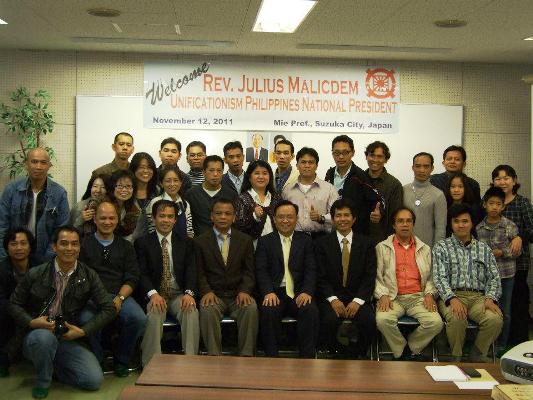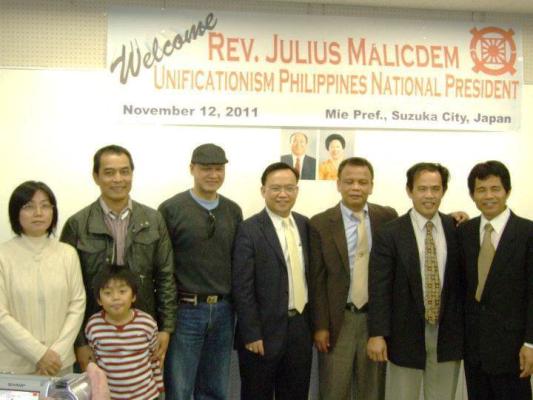![]()
The Words of the Ablong Family
|
|
The Words of the Ablong Family |

General Report. This is all we can do right now because of limited time. Strategic Planning needs a lot of time.
Kuya Dante Negre
Roy Carumba
Rafael E. Ablong
Jun Flores Bal Tuballa
Jess Mariano
Joey Andaya
6:00 p.m. at Rev. Roy Carumba's House
1. Spiritual Life –
Sunday Services are held regularly in community centers or Japan churches. Approximately 60% of our Filipino members in Japan specifically in Tokyo area are not attending PUCMJ church services and activities. Philippine members in Kyushu and Okinawa Islands (Western Japan) usually do their Sunday services at home or in Japan Church centers. A few Philippine members can no longer attend or even do their Sunday services because of their work shift schedule.
Hoon Dok Hae tradition is understood and practiced by most members. We are not so sure of the number of members who are really doing it.
Some members went back to the Philippines to mobilize like Francis Javier and Robert Angelitud. So there is a need to update the list of our members in Japan.
Some couples are not communicating with each other anymore due to work schedules and some stress-inducing factors like unhealthy sex life and less-active spiritual or social life.
Isolated cases of domestic violence (husbands beating their wives or children) have been verbally-reported by a few members. The real cause have not been truly verified, reported or documented.
2. Tithes/ Donations –
Approximately 60% of our Filipino members in Japan specifically in Tokyo Area are not giving their tithes. The number of members who are giving donations is increasing but the number of those who are giving their tithes (10% of their income) is decreasing. Japanese wives who are working in Japan while their husbands and children are in the Philippines do not give to PUCMJ.
1. Organization -- PUCMJ national executive leader also was changed recently.
2. Rev. Park's position: receives tithes and donations and sends it to HQS; gives Sunday Service, inspiration and guidance to members in Japan.
3. Accountant gives copies of the reports of tithes and donations to: Headquarters, Rev. Park, PUCMJ national executive leader and regional leaders.
4. Kuya Dante Negre have to check or counter-check the report of tithes and or donations to Philippine Hqs.
5. Rev. and Mrs. Funami's position is purely advisory.
6. A Note on Decision Making: Majority of those present in any meeting can make decisions. A follow-up explanation of the decision should be made for those who are absent.
1. Written official job description of Rev. Park and Rev. and Mrs. Funami.
2. Updated list of members in Japan categorized into:
-Giving Tithes Regularly
-Giving Tithes Occasionally
-Not Giving Tithes
-Not Giving Tithes/Not Attending Services (NGA)
3. Improve the family or Hoon Dok Hae education of Japanese wives through online, fax, email or post-mailed information.
4. Make tithe and charity (donation) part of the education curriculum of church members in the Philippines
5. Push through with the plan to make Sunday Services at Philippine headquarters available to Japanese wives (in Japanese). This is very important to connect the Japanese wives more internally, with deeper and clearer understanding about what is really going on and how they can help.
6. Follow-up earlier proposals for at least one full-time missionary for each region in Japan.
1. Purchase or acquisition of fixed building or facilities.
2. Family members or 2nd generation educational trips to Philippines or Korea (as a group or as families, etc.)

Strength: Tithes and Donation
1. More members are giving donations than tithes in response to occasional or regular solicitation letters from centers, tribes and organizations.
2. Tribal messiah direction of international headquarters is encouraging members to do their tribal mission.
3. Prevailing mentality and attitude about the similar meaning of tithes and donations are a strength or weakness depending on the understanding, training or experience of individual members. 10% OR TITHES is real pressures and stress-generator for members who are not earning enough for their growing children. Donation is like an escape route or a good option to think about how to think about when a member cannot give the real ten percent of their earnings.
Strength: Communication
1. There is more communication within the local groups now.
2. ICTs (Information and communication technologies) are helping us a create more online discussions on skype, YM, Facebook, via email etc.
3. We see more friction and contradictions as a result of improvement in our communication.
? Strength: Education System (2nd generation, wives, husbands)
1. Japan Church is a good receiving system or structure for 2nd generation who are going to secondary schools in Japan.
2. Circles like TIMD, and Sunday school activities for children are helping sustain the education of our 2nd generation in addition to healthy sports and leisure activities provided by Japanese schools and community centers.
3. There is more clarity in the educational and situational coordination between PUCMJ and Japan church when it comes to our existence in Japan depending on location.
4. Blessed couples' education is now more open to Philippine members in Japan. Hqs is giving more information about these opportunities but this effort should be sustained and improved.
Witnessing
1. Tribal witnessing – there is more flexibility and clarity of direction and coordination.
2. We started witnessing to others in Japan and have produced results in all three regions compared to nothing (in Japan) in the past years before last year.
3. More members are beginning to realize the importance of multiplying the blessing in order to have more people to raise funds.
Organization
1. We are stronger now in terms of witnessing in Japan because of our external or social connections.
2. We have created groups or organizations that can help us educate or socialize with members (FINICA, TIMD, UFPA, BAND) and attract non-members like Filipino-Japanese Movement for Global Peace, Federation of Foreign Workers for Peace, K-PhilJap and Peace Striders.
3. There is more openness to express our selves as Unification Church ministry members, not as Commando members. Commando is not a very good term to use especially in countries with a militaristic history like Japan.
Activities
1. We have a band composed mostly of Divine Principle-educated members.
2. We have more activities that include secular or non-Unification Church people through our affiliate organizations.
3. We have more members who are now engaged in charity or educational activities outside Japan.
Weakness: Tithes and Donation
1. We do not have a standard curriculum for teaching tithe education.
2. Tithes and donations are all channeled to the Philippines for providential activities. But there is no substantial, visible result or product of members' tithes.
3. Some spouses do not like to tithe or donate.
Weakness: Communication
1. ICTs have produced some "internet" members. This means that some members attend Sunday services through the internet without ever going to a real church.
2. Husbands and wives no longer communicate with each other because of their work and family (children's) schedule.
3. The new leadership in the Philippines and in Tokyo is also creating more openness and hope for many members. Some have started tithing or donating again.
4. Language and cultural difficulties, miscommunication and misunderstandings affect the overall capability of Filipino husbands and Japanese wives to work together for the family and the overall mission.
Weakness: Education System (2nd generation, wives, husbands)
1. Education curriculum for church members does not include an intensive tithe education and time (priority) management before they come to Japan or go elsewhere on a mission.
2. A Japanese member should be ready to help Rev. and Mrs. Funami as an IW to conduct special wives education or fellowship seminars or visitations.
Weaknesses: Witnessing
1. Members who are going home to do their tribal missions (Divine Principle education, True Father's autobiography distribution, etc) do not usually coordinate with other members who are planning to do the same.
2. Some affiliated organizations (members) do not like to reveal their true identities, basic principles and religious affiliations for fear of religious persecution or suspicion.
1. Approach Japan and Philippine church and ask them about current programs and events for the 2nd generation and Filipino family members in Japan.
2. New leadership of Rev. Julius Malicdem and Kuya Dante give a spirit of better opportunities, clearer direction and reason for openness, compromise, forgiveness, reconciliation and development.
3. Continue to love and care as brothers and sisters to all members including those who have gone to other groups or churches.
4. Work to make some of our affiliated organizations like TIMD, FINICA (Filipino-Nihonjin Couples Association)and UFPA (United Filipinos for Peace and Advancement) into Japan NPOs (like NGOs) so we can receive some government funding.
1. Parents who are unable to educate their blessed children according to our traditions and doctrine will find it difficult to educate or control their children.
2. Miscommunication and lack of coordination due to lack of love, language and cultural understanding between husbands and wives and members in our community affect our overall capability to give for the Philippine providence.
PUCMJ Council of elders Meeting ended at 7:35 pm. Roy Carumba's Residence. November 12, 2011
Prepared and reported by:
Rafael E. Ablong
Vice-National Executive Minister for External
Affairs and Western Regional Executive Minister
Philippine
Unification Church Ministry in Japan (PUCMJ)
Noted by:
Rev. Dante Negre
National Executive Minister
Philippine
Unification Church Ministry in Japan (PUCMJ)
Rev. Roy Carumba
Vice-National Executive Minister for Internal
Affairs and Central Regional Executive Minister
Philippine
Unification Church Ministry in Japan (PUCMJ)